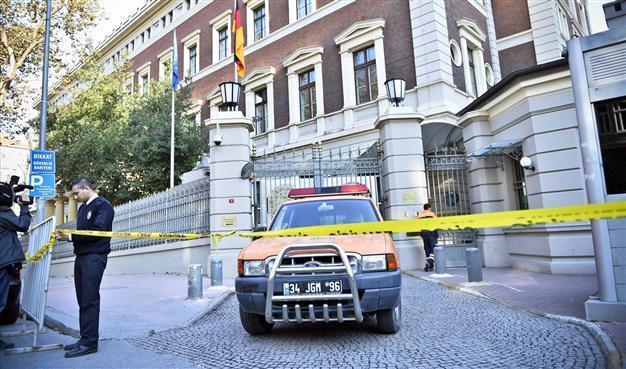Turkey identifies mysterious powder sent to consulates as chalk dust
ANKARA

AA Photo
The suspicious powdery substance that was sent to six consulates in Istanbul, leading to the hospitalization of more than 30 staff members, was a material similar to chalk dust, a Turkish official has said.Health Ministry Undersecretary Eyüp Gümüş said Oct. 28 that the powder tested negative for biological and toxic agents.
The consulates of Canada, Belgium, Germany, France and the United States were sent envelopes containing the powder on Oct. 24, leading to the evacuation of some of the missions and the hospitalization of 25 staff.
The Hungarian Consulate received a similar package on Oct. 27 and six of its staff members were hospitalized.
Gümüş said the 25 were discharged on Oct. 27 after authorities determined that the material was non-toxic. The six Hungarian consulate workers were set to be released on Oct. 28.
The Turkish authorities have opened an investigation, though no arrests have yet been made.
In a written statement released on Oct. 28, the Foreign Ministry urged all diplomatic missions in Turkey and Turkey’s diplomatic missions abroad to be vigilant and to immediately contact the related authorities in the event of encountering a suspicious incident. The ministry cited the Disaster and Emergency Management Directorate (AFAD) as the relevant authority for diplomatic missions in Turkey.
Gümüş, meanwhile, also announced that no Ebola case had been detected within Turkey’s borders, where a total of 45 hospitals in 36 provinces are currently functioning as reference hospitals with regard to Ebola diagnoses.
So far, 28 patients have been held on suspicion that they had Ebola and 12 of them were eventually diagnosed with malaria, he said.
In addition, Gümüş stated that since 2012 a total of 1,010 samples have been tested for the deadly Middle East Respiratory Syndrome Coronavirus (MERS-CoV) virus.
Among those samples, 932 tests came back negative for MERS-CoV and only one came back positive. One man in the southern border province of Hatay who had previously worked in Saudi Arabia lost his life due to MERS-CoV, Gümüş said.
















